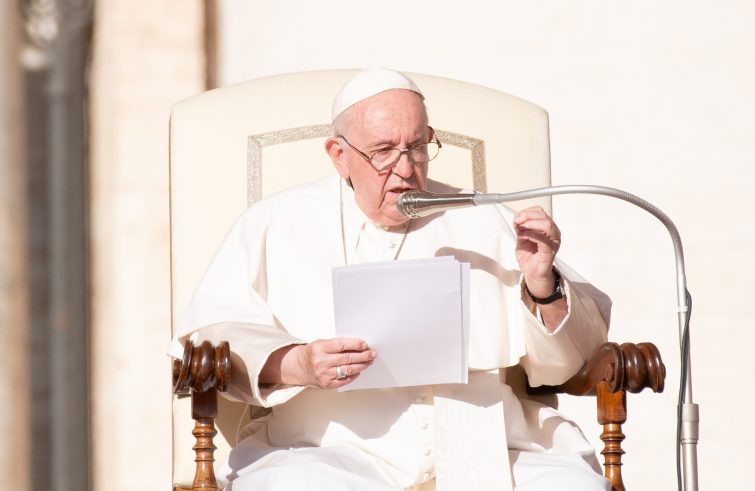
“Let us turn our thoughts to the tormented Ukraine and let us pray for Ukraine. We pray for the horrible things that are happening there: torture, deaths, destruction.” This final appeal concluded the Pope’s general audience in St. Peter’s square, centred on yet a further “indispensable ingredient” for discernment: one’s own life story. “Our life is the most precious “book” that is given to us, a book that unfortunately many do not read, or rather they do so too late, before dying”, Francis denounced: “And yet, precisely in that book that one finds what one pointlessly seeks elsewhere.” Francis thus quoted from St. Augustine: “’Return within yourself. In the inner man dwells truth’. This is an invitation I would extend to all of you, and even to myself”, Francis continued off-text:
‘Return within yourself. Read your life. Read yourself inwardly, the path you have taken. With serenity.”
“Many times, we too have had Augustine’s experience, of finding ourselves imprisoned by thoughts that lead us away from ourselves, stereotypical messages that harm us: for example, ‘I am worthless’ – and it gets you down; ‘everything goes wrong for me’ – and it gets you down; ‘I will never achieve anything worthwhile’ – and it gets you down, and this becomes your life. These pessimistic phrases that get you down!”, the Pope remarked. He said:
“Reading one’s own history also means recognizing the presence of these “toxic” elements,
but then broadening our narrative, learning to notice other things, making it richer, more respectful of complexity, succeeding also in grasping the discreet ways in which God acts in our life.”
“God’s style is discreet”,
Francis’ indication for sound discernment: “God likes to go unseen, with discretion, he does not impose; he is like the air we breathe – we do not see it but it allows us to live, and we realize this only when it is missing.” In other words, discernment “has a narrative approach”, Francis said: “it does not dwell on the punctual action, but rather inserts it in a context: where does this thought come from? Where does it lead me, what I am thinking now? When have I encountered it before? Is it something new that comes to mind only now, or have I found it other times? Why is it more insistent than others? What is life trying to tell me with this?.” “Recounting the events of our life also enables us to grasp important nuances and details, which can reveal themselves to be valuable aids, hitherto concealed”, the Pope assured: “a reading, a service, an encounter, at first sight considered to be of little importance, over time transmit inner peace; they transmit the joy of living and suggest further good initiatives. Stopping and acknowledging this is essential. Stopping and acknowledging: it is important for discernment; it is a task of gathering those precious and hidden pearls that the Lord has scattered in our soil.” “Goodness is hidden, always, because goodness is modest and hides itself”, Francis’ description: “it is silent, it requires slow and continuous excavation.”
“Let us ask, at the end of the day: what happened today in my heart?”,
the Pope asked in unscripted remarks: “Some think that carrying out this examination of conscience is to calculate the balance of sins – and we commit many – but it is also about asking oneself, “What happened within me, did I experience joy? What brought me joy? Was I sad? What brought me sadness? And in this way, we learn to discern what happens within us.” “Getting used to rereading one’s own life educates the outlook, it sharpens it, enables it to note the small miracles that good God works for us every day”, the Pope explained: “When we realize this, we notice other possible directions that strengthen our inner taste, peace and creativity. Above all, it makes us freer from toxic stereotypes.” “Wisely it has been said that the man who does not know his own past is condemned to repeat it”, Francis pointed out. He continued off-text: “It is strange: if we do not know the path we have taken, the past, we always repeat it, we go around in circles. The person who walks in circles never goes forward; it is not progress, it is like the dog who chases his own tail.” “We might ask ourselves: have I ever recounted my life to anyone?”, the Pope’s advice:
“This is a beautiful experience of engaged couples, who when they become serious, tell their life story.”
It is one of the most beautiful and intimate forms of communication. It allows us to discover hitherto unknown things, small and simple but, as the Gospel says, it is precisely from the little things that the great things are born.” “The lives of the saints also constitute a precious aid in recognizing the style of God in one’s own life”, Francis’ recommendation: “they permit us to become familiar with his way of acting. Some of the saints’ behaviour challenges us, shows us new meanings and opportunities. This is what happened, for example, to Saint Ignatius of Loyola. When describing the fundamental discovery of his life, he adds an important clarification, and he says: ‘From experience he deduced that some thoughts left him sad, others cheerful; and little by little he learnt to know the diversity of thoughts, the diversity of the spirits that stirred within him’.” “Knowing what happens within us, knowing, being aware”, the Pope added: “Discernment is the narrative reading of the good moments and the dark moments, the consolations and desolations we experience in the course of our lives. It is the heart that speaks to us about God, and we must learn to understand its language.”











